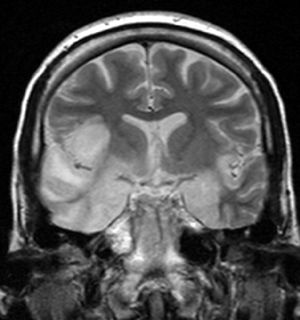Encephalitis
- Original Editor - Kehinde Fatola
Top Contributors - Kehinde Fatola, Lucinda hampton, Kim Jackson and Nupur Smit Shah
Introduction[edit | edit source]
Encephalitis is a very severe infection caused by the inflammation of the brain tissues. When encephalitis occur with meningitis, it is called meningoencephalitis. It is caused either as a direct infection or a sequela of a pre-existing condition. [1]
Causes[edit | edit source]
Encephalitis is caused by any of the following factors; [2]
- Viral infection, e.g rabies virus, HSV, poliovirus, mealses virus, bunyavirus, reovirus, etc [3]
- Bacterial infection, e.g mycoplasma, Lyme disease, Bartonella henselae, malaria, etc can result in encephalitis especially in immuno-compromised individuals.
- Autoimmune disorders
- Some types are of unknown aetiology
Clinical Presentation[edit | edit source]
An adult infected with the disease typically present with; [4]
- Headache
- Confusion
- Fever
- Drowsiness
- Fatigue
- Seizures or convulsions
- Tremors
- Stroke
- Hallucinations
- Memory problems
An infant may present with; [5]
- Irritability
- Poor appetite
- Fever
Diagnostic Procedures[edit | edit source]
Encephalitis can be diagnosed using any of the following procedures; [1]
- Magnetic Resonance Imaging (MRI) to detect the inflammation
- Electroencephalography (EEG) to monitor the electrical activity of the brain
- Lumbar puncture (spinal tap)
- Urine analysis
- Blood test
Medical Management[edit | edit source]
These may include; [1]
- Antiviral medications (for viral infection)
- Antibiotics (for bacterial infection)
- Steroids
- Sedatives
- Acetaminophen
Physiotherapy Management / Interventions[edit | edit source]
- Exercise therapy
- Gait rehabilitation
- Manual therapy
- Passive motion procedures
Differential Diagnosis[edit | edit source]
- Leptospirosis
- CNS vasculitis
- Meningoencephalitis
- Stroke
- Meningitis
- Subdural empyema
- Meningeal carcinomatosis
References[edit | edit source]
- ↑ 1.0 1.1 1.2 Kennedy PGE. Viral Encephalitis: Causes, Differential Diagnosis, and Management. Journal of Neurology, Neurosurgery & Psychiatry. 2004;75 (suppl 1): i10–i15
- ↑ Larner AJ. Neuropsychological Neurology: The Neurocognitive Impairments of Neurological Disorders. 2013. Cambridge University Press.
- ↑ Fisher DL, Defres S, Solomon T. Measles-induced encephalitis. QJM. 2015; 108 (3): 177–182.
- ↑ Jmor F, Emsley HC, Fischer M. et al. The incidence of acute encephalitis syndrome in Western industrialised and tropical countries. Journal of Virology.2008; 5 (134): 134.
- ↑ Armangue T, Petit-Pedrol M, Dalmau J. Autoimmune Encephalitis in Children. Journal of child neurology. 2012; 27 (11): 1460–1469.







